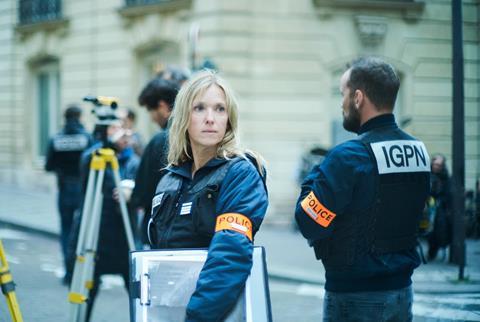The 2018 Paris Yellow Vests protests provide the backdrop for this controlled procedural

Dir: Dominik Moll. France. 2025. 116mins
In Case 137, a French Internal Affairs officer investigates police misconduct during the 2018 yellow vests protests, only to realise that what she’s also trying to uncover is whether her job makes any difference at all. Lea Drucker gives a marvellous performance as a dedicated public servant determined to find the cops who gravely injured an innocent 20-year-old man. Director Dominik Moll’s straightforward procedural sometimes succumbs to heavy-handedness, but Drucker’s performance supplies the story with its crucial emotional undercurrent.
A laudable awareness of the racial, class and gender issues at play
This is Moll’s first film to screen in Cannes Competition since 2005’s Lemming. (His 2022 box office hit and Cesar-winning thriller The Night Of The 12th played in Cannes Premiere.) Case 137 opens in France in November and the material’s examination of police brutality and institutional corruption is certainly timely.
The film is set during the events of December 2018, when the yellow vests (gilets jaunes) protests led to violent clashes between the heavily-armed police and anti-tax demonstrators. In the fictional Case 137 Stephanie (Drucker), a member of the IGPN (’the police’s police’), moves to opens an inquiry into an attack on Guillaume (Come Peronnet), a young man who attended the protests and was shot with a riot gun by police. She is trying to find out who is responsible for what she believes was an unprovoked attack, which has led to Guillaume suffering a fractured skull and brain damage.
Working with frequent writing partner Gilles Marchand, Moll incorporates actual photos and videos taken during the protests into the story. That archival footage lends Case 137 an air of verisimilitude, as does the director’s stripped-down approach to Stephanie’s investigation. Preferring unflashy camera setups, Moll gives the many scenes of Stephanie questioning policemen or witnesses a dry, crisp efficiency. Even when there are breaks in the case — for instance, when she tracks down a timid maid, Alicia (Guslagie Malanda, Saint Omer), who might have seen what happened to Guillaume — Case 137 eschews melodramatic theatrics.
Instead, the film adopts its protagonist’s rigorous, relentless drive. Refreshingly, Stephanie’s stern devotion to her job is never fully explained in the trite ways of other police dramas. There are certainly hints of why she went from being a police officer to investigating wrongdoing within the force — including, perhaps, an ex (Stanislas Merhar), a hard-nosed cop — but Moll never patronises his savvy heroine by suggesting she is trying to fill some spiritual void.
Rather, Case 137 simply presents Stephanie as someone who believes passionately in her job — despite the fact that it is largely thankless. Indeed, Stephanie receives verbal abuse from both Guillaume’s anguished family, who are angry because they feel she isn’t working fast enough, and police officers who think she’s betraying them at a time when law enforcement is receiving intense criticism.
Intriguingly muted throughout, Drucker rarely allows Stephanie a moment of release from the toll this investigation slowly takes on her character. Still, we see the strain in Stephanie’s tired eyes – not that she would ever allow herself to use exhaustion or stress as an excuse. Drucker makes her character’s resilience and resourcefulness heroic, even as Stephanie begins to grasp the potential hopelessness of her quest to bring the offending policemen to justice. And if she does fail, will that invalidate the ceaseless energy she puts into proving that bad cops won’t get away with their crimes?
Case 137’s no-frills style can leave the film feeling a tad generic, and one wishes that Moll resisted underlining some of his thematic points so strenuously. But there’s a laudable awareness of the racial, class and gender issues at play in this story of a dogged middle-aged woman going into battle against a heavily male police force. (Malanda is superb in the small but pivotal role as a key eyewitness frightened to get involved.) Appropriately, Case 137 ends quietly, recognising that this is just one case of police wrongdoing among hundreds, the outcomes rarely resulting in happy endings.
Production company: Haut et Court
International sales: Charades, sales@charades.eu
Producers: Caroline Benjo, Barbara Letellier, Carole Scotta
Screenplay: Dominik Moll, Gilles Marchand
Cinematography: Patrick Ghiringhelli
Production design: Emmanuelle Duplay
Editing: Laurent Rouan
Music: Olivier Marguerit
Main cast: Lea Drucker, Jonathan Turnbull, Mathilde Roehrich, Guslagie Malanda
























